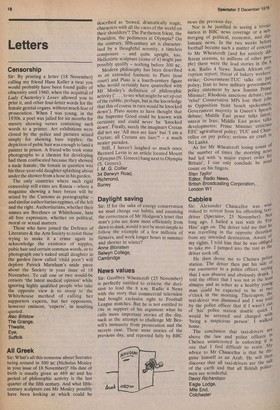All Greek
Sir: What's all this nonsense about Socrates being around in 500 BC (Nicholas Mosley in your issue of 18 November)? His date of birth is usually given as 469 BC and his period of philosophic activity is the last quarter of the fifth century. And what fifthcentury sculpture can Mr Mosley possibly have been looking at which could be described as 'bowed, dramatically tragic, characters with all the cares of the world on their shoulders'? The Parthenon frieze, the Poseidon, the pediments at Olympia? On the contrary, fifth-century art is characterised by a thoughtful serenity, a timeless composure — and quite upright, too. Hellenistic sculpture (some of it) might just possibly qualify — nothing before 300 BC.
Modern philosophy has been described as an extended footnote to Plato (tout court) and Plato is a fourth-century figure who would certainly have quarrelled with Mr Mosley's definition of philosophic activity C . . . to see what might be set up out of the rubble, perhaps, but in the knowledge that this of course in turn would be knocked down'). Plato seems to have thought that the Supreme Good could be known with certainty and could never be 'knocked down'. Finally, surely the imaginary Cretan did not say 'All men are liars' but 'I am a Cretan; all Cretans are liars'? — a much neater paradox.
Still, I haven't laughed so much since, Bernard Levin in an article located Mount Olympus (N. Greece) bang next to Olympia (S. Greece). L M. G. Collier 34 Berwyn Road, Richmond, Surrey






































 Previous page
Previous page